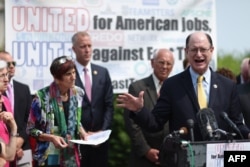While President Barack Obama promotes trade opportunities between the United States and Asia, U.S. senators of both political parties tell VOA there is virtually no chance Congress will approve the Trans-Pacific Partnership in the near future.
Speaking Monday in Vietnam, Obama said he was “confident” TPP would pass Congress, a prediction Republican Senator Lindsey Graham of South Carolina described as “somewhere between delusional and overly optimistic.”
“There’s been a sourness on trade [in Congress],” Graham added.
“It [TPP] is a tough lift,” said Democratic Senator Chuck Schumer of New York, who is widely expected to lead his party in the chamber next year.
Another Democrat, Dick Durbin of Illinois, said none of the remaining presidential contenders — Donald Trump, Hillary Clinton and Bernie Sanders — supports TPP.
“When you have the three leading presidential candidates of both parties opposing TPP, it’s an indication that political sentiment is not in favor of the agreement,” Durbin said.
'Skepticism across America'
The pact would reduce trade barriers among 12 Pacific Rim nations that account for 40 percent of global economic output. While strongly backed by most American business groups, TPP is fiercely opposed by labor unions, environmental groups and some human rights organizations.
“There’s a skepticism across America about trade agreements,” Durbin added. “We’ve paid a heavy price in American manufacturing jobs going overseas. So that skepticism is well-placed.”
“There are winners and losers in every trade deal,” conceded Mark Warner of Virginia, one of only a handful of Senate Democrats openly backing TPP. “But the irony is, a lot of this [economic] dislocation, particularly vis-à-vis trade with China, has already taken place. And TPP doesn’t even deal with China.”
TPP supporters hope for congressional votes after the November elections, in what is known as the “lame duck” period. That possibility is not ruled out by Utah Republican Orrin Hatch, chairman of the Senate Finance Committee, who championed so-called “fast track” authority to streamline congressional consideration of trade deals.
But even Hatch has reservations about TPP.
“I think Republicans do want to support it, but there need to be some changes,” he said.
Issues deemed 'solvable'
Hatch objects to the length of time U.S. firms would enjoy exclusive rights to pharmaceutical and biologic products.
“The most problematic area is the data exclusivity provision of only five years,” the senator said. “We need to solve some of these problems, but I think they are solvable.”
Seven years of negotiations produced the accord that was signed in New Zealand in February. Trade experts say that while amending the pact is not impossible, participating nations will be loath to go back to the negotiating table.
Warner sees the pact in economic and geopolitical terms.
“I’d rather have this multilateral, American-led effort to set the rules for the world’s fastest-growing economies, rather than default to rules — or lack of rules — that would be driven by China,” he said.
Graham says he regrets that attitudes on Capitol Hill and in many parts of the country have soured on deals like TPP.
“Part of what you see in American politics today is making America the victim of everything. Well, I don’t feel like a victim,” he said. “I want to shape the world, not be cowered by it. I want good trade agreements. I want them to be fair. … This cowering approach — fortress America — doesn’t befit a great nation.”

